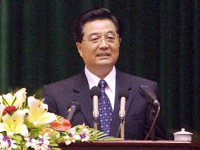
Visiting President Hu Jintao yesterday became the first foreign leader to address Vietnam's parliament, as he called for closer links between Beijing and Hanoi.
Hu said the two neighbors are both at a "crucial stage" of reform and development, a stage that demands more cooperation and mutual trust.
"It is in line with the fundamental interests of the two peoples to enhance our friendship and trust, propel cooperation of mutual benefit, and promote common development," Hu told the National Assembly.
Hu said China-Vietnam relations have entered a new era of "all-round friendship and cooperation," and reiterated China's pursuit of peace, mutual benefit and dialogue over divergences in diplomacy with neighboring countries.
On China's domestic front, Hu told the 500 people present that the country had scored an average 9.4 percent gross domestic product (GDP) growth in the past 26 years, and the GDP is expected to quadruple to US$4 trillion by 2020.
Do Gia Thang, a Vietnamese official from the government's bill drafting committee, said he was deeply impressed by China's development. "China's economy has achieved great success. There is a lot we could learn from China," Do said.
"It is natural for Vietnamese to think about learning from China, given our similar social systems and close cultural bonds that date back to centuries ago."
Before the speech, Hu met with Vietnamese Prime Minister Phan Van Khai and National Assembly President Nguyen Van An.
Phan said that the agreements on economic and technological cooperation signed on Monday would usher in breakthroughs in bilateral economic relations.
Vietnam is willing to cooperate with China in the fields of investment, border trade and tourism to promote economic links, said Phan.
Hu arrived in Hanoi on Monday for an official visit. He will wind up the visit and fly back to Beijing today.
Oil exploration
In a related development, China National Offshore Oil Corp (CNOOC), the country's biggest offshore oil and gas producer, on Monday signed a framework agreement with a Vietnamese oil firm to jointly explore oil and gas in the Beibu Bay.
The agreement was one of more than 10 deals signed by the two countries in Hanoi on the sidelines of talks between the top leaders.
The agreement, based on the principle of "putting aside disputes and jointly developing resources," marks a significant step in oil and gas exploration in the South China Sea, a statement by State-owned CNOOC said.
It was published on the website of the State-owned Assets Supervision and Administration Commission of the State Council yesterday.
CNOOC spokesman Liu Junshan said the deal will build a solid foundation for both sides to tap the oil and gas resources in the Beibu Bay, set a good example for solving cross-border disputes, and contribute to the stability and development of the South China Sea area.
But he did not reveal any further details.
In March, CNOOC and State-owned oil companies of the Philippines and Vietnam signed an agreement on marine seismic undertaking in the South China Sea, under which they will jointly gather seismic data in the 140,000-square-kilometer sea area in the next three years. The cooperation started in August, CNOOC said.
(China Daily November 2, 2005)
|

